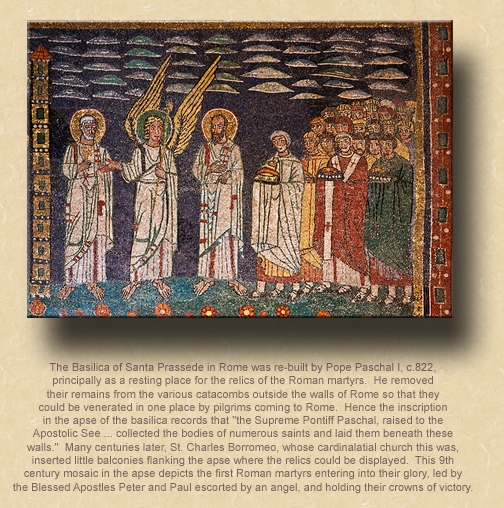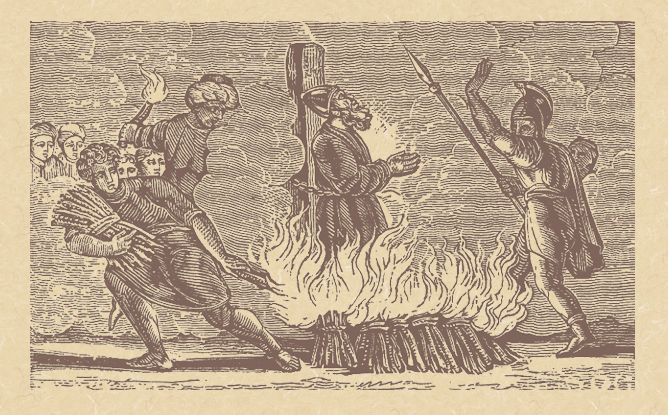A Patron Saint for the Unfairly Treated.
The Twenty-Eighth Monday of Ordinary Time; or, the Memorial of Saint Callistus I, Pope & Martyr.
Lessons from the primary feria, according to the ordinary form of the Roman Rite:
• Romans 1: 1-7.
• Psalm 98: 1-4.
• Luke 11: 29-32.
|
If a Mass for the memorial is taken, lessons from the feria as above, or from the proper:
• I Peter 5: 1-4.
• Psalm 40: 2, 4, 7-11.
• Luke 22: 24-30.
…or, any lessons from the common of Martyrs for One Martyr, or the common of Pastors for a Pope.
|
The Third Class Feast of Saint Callixtus, Pope & Martyr.*
Lessons from the common "Si díligis me…" for One or Several Holy Popes, according to the extraordinary form of the Roman Rite:
• I Peter 5: 1-4, 10-11.
• Psalm 106: 32-31.
• Matthew 16: 13-19.
FatherVenditti.com
|
 6:22 AM 10/14/2019 — Poor Saint Callistus, in addition to being a martyr, suffered the indignity of being remembered only through a single account of his life written by one of his bitter enemies. Apart from that, we have no other sources to tell us about this third century pope. 6:22 AM 10/14/2019 — Poor Saint Callistus, in addition to being a martyr, suffered the indignity of being remembered only through a single account of his life written by one of his bitter enemies. Apart from that, we have no other sources to tell us about this third century pope.
That enemy was Saint Hippolytus, a rival for the papal throne. Hippolytus is a saint because he ultimately died a martyr himself, but spent most of his time, it seems, criticizing the Pope. His chief complaint was that he felt Callistus was too lax in dealing with public sinners. This period of church history was marked by what historians refer to as the lapsi controversy, centering around the question of whether someone who had committed a cardinal sin of adultery, fornication or murder could be readmitted back into the Church. Callistus took the position that no matter what sins a person had committed, if he repented and did penance, he could be restored to full communion with the Church, which is what we believe today; but, Hippolytis—and a great many other prominent churchmen at the time—disagreed. We, of course, have to be grateful that Pope Saint Callistus prevailed in this matter.
Those of you to may attend Holy Mass in the extraordinary form—the Traditional Latin Mass—may be familiar with the fasting days known as “Ember Days.” It was Pope Saint Callistus who invented them. They occur at the beginning of the four seasons of the year, and they are intended thank God for blessings obtained during the past year and implore further graces for the new season; and, their importance in the Church was formerly very great. They are fixed on the Wednesday, Friday and Saturday of specific weeks in their respective seasons: after the First Sunday of Lent for Spring, after Pentecost for Summer, after the Feast of the Elevation of the Cross for Autumn, and after the Third Sunday of Advent for Winter. Not only do they consecrate to God both the liturgical seasons and the various seasons in nature, they also serve as a penitential preparation for those preparing for the Holy Priesthood. Ordinations in the extraordinary form generally take place on the Ember Days, and the Faithful are encouraged to pray on these days for good priests.
Callistus is also remembered for having established the first Christian cemetery in Rome, known today as the Catacombs of Saint Callistus. If fact, he was martyred in those very catacombs while offering Holy Mass with two of his deacons, probably around the year 222; and, many years ago I had the rare privilege of offering Mass myself on his very tomb.
Hippolytus alleges a lot in his attempt to malign Callistus: that he was a runaway slave, that he connived and bribed his way into the papacy, that he solemnized marriages between slaves and freemen, that he secretly lived an immoral and worldly life, and on and on. Nobody remembers Hippolytus anymore;—even though, because of his martyrdom, he is a saint—but, Callistus we remember well and celebrate with a feast on the calendar, even though so much about his life remains unknown for certain.
All of us, I think, have had the experience of having our reputation trashed by someone. During such a time, Saint Callistus is a good man to emulate. After all, we would know nothing about him at all were it not for a single account written someone who hated him; and yet, here we are remembering him on his feast. Let’s ask for his intercession, especially during those times when we feel ourselves maligned unjustly or simply misunderstood. Let’s ask our Blessed Lord to shower on us the grace He poured out on Saint Callistus to persevere in the most trying of times.

* The Missal of St. John XXIII uses this alternate spelling of today's saint.
|

